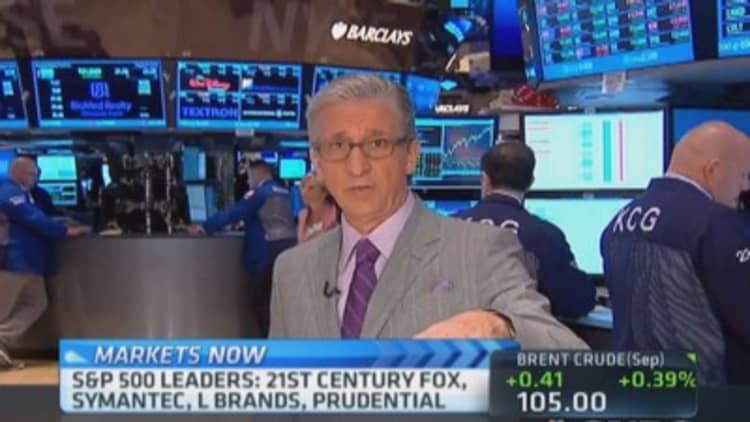
U.S. stocks declined on Thursday, pushing the Dow further into the red for the year, as Wall Street echoed action in European markets amid unease over the crisis in Ukraine.
"Putin is still the big wild card in all of this," said Chris Gaffney, senior market strategist at EverBank Wealth Management, referring to Russian President Vladimir Putin.
European shares fell amid media reports that had NATO Secretary General Anders Fogh Rasmussen urging Russia to "step back from the brink" by withdrawing troops and stopping its support of rebels in Eastern Ukraine.
"It's the yo-yo action in Europe that we keep following, as they sold off, we sold off," said Peter Boockvar, chief market strategist at the Lindsey Group.
Read More
"If tensions escalate, what does that do to the markets: It drives people to dollars, and into Treasuries for liquidity safe haven, and keeps a lid on interest rates here in the U.S.," said Gaffney.
"Escalations in Russia-Ukraine tensions definitely have a bigger impact on Europe than here. U.S. companies are somewhat protected," Gaffney added.
Another conflict had President Barack Obama reportedly weighing airstrikes against the Islamic State in Iraq and Syria, or ISIS, or airdrops of food and medicine to aid as many as 40,000 religious minorities in Iraq.
"Many people are itching, waiting for a correction, since we've gone so long without one. But we would say it's not justified by earnings expectations, as they continue to show improvement," said Nick Raich, CEO at the Earnings Scout.
Wendy's reported quarterly profit just shy of estimates and revenue that exceeded forecasts, with shares of the fast-food chain rising; Keurig Green Mountain reported quarterly profit the beat estimates and hiked its full-year outlook, with shares of the one-cup coffee brewers gaining.
Major U.S. Indexes
After a 61-point climb, the Dow Jones Industrial Average fell as much as 109 points, and ended down 75.07 points, or 0.5 percent, at 16,368.27, leaving it down 1.3 percent on the year and off by 4.6 percent from its intraday record high set July 17.
Six blue-chip stocks traded in correction territory, down more than 10 percent from their respective 52-week highs: Boeing, Pfizer, United Technologies, Visa, American Express and McDonald's.
The dropped 10.67 points, or 0.6 percent, to 1,909.57, with health care leading sector losses and utilities and industrials the sole gainers among the S&P's 10 main industry groups.
The Nasdaq lost 20.08 points, or 0.5 percent, to 4,334.97.
For every seven shares rising, roughly eight declined on the New York Stock Exchange, where 670 million shares traded. Composite volume cleared 3.2 billion.
On the New York Mercantile Exchange, gold futures reversed higher, climbing $4.30, or 0.4 percent, to $1,312.50 an ounce; crude-oil futures rose 42 cents, or 0.4 percent, to $97.34 a barrel.
The dollar gained against other currencies; the 10-year Treasury yield shed 6 basis points to 2.416 percent, according to FactSet.
"The 10-year below 2.5 percent is conducive to an environment of sustained profit margins; it's a fragile recovery and very interest-rate sensitive; the tipping point that we've measured twice in the past year is 3 percent on the 10-year yield and 4.75 percent on the 30-year," said Raich at the Earnings Scout.
Stocks had opened higher, after upbeat data on the labor market, with the government's tally of Americans filing for unemployment benefits last week declining by 14,000 to 289,000, and the four-week average falling to 293,500, the lowest since 2006.
The European Central Bank held interest rates unchanged, as expected, with the decision coming after the ECB reduced its deposit rate below zero in June.
At a news conference after the ECB move, ECB President Mario Draghi reaffirmed the ECB would consider unconventional moves, such as the buying of asset-backed securities, should its medium-term outlook for inflation change.
"The ECB basically had no choice but to sit back and wait for their June announcements to play themselves out. There was no progress on the ABS program; I was hoping to get more details, so if I was to point to one thing, it would be that," Boockvar said of any market disappointment in the wake of Draghi's words.
On Tuesday, stocks ended little changed as investors sorted through developments in Ukraine and considered two derailed deals.
Read MoreS&P 500 ends near two-month low

—By CNBC's Kate Gibson
Coming Up This Week:
Friday
Earnings: Brookfield Asset Management, Buckeye Partners,Petrobras
8:30 a.m. Productivity and costs
10:00 a.m. Wholesale trade
More From CNBC.com:


